Life back in Timaru since coming back from the US three months ago quickly settled into our now-familiar routine: work, Tuesday dinners with colleagues, Wednesday night Pub Quiz at the Sail and Anchor, a few regular Kiwi TV shows, a movie on the non-working weekends, and an occasional weekend outing. It is all comfortable but does not make for scintillating fodder for a blog so I deferred until now. Enough interesting stuff? You will be the judge.
Local news has largely been dominated by the horrific and embarrassing US election campaign, as it has at home and around the globe. The debates have been carried live here and in Australia (and Iran, I understand). As Tom Hanks said of the last debate on SLN:
The debate is “like the third Lord of the Rings movie: You don’t really want to watch, but hey, you’ve come this far.”
PLEASE MAKE IT STOP!!!!
In other new, the Junior Doctors have just finished a two day strike action to protest working shifts (not 24 hours) over 12 consecutive days. This has been controversial even among themselves. with several declining to participate. We covered the situation here well without any major problems. I have some conflicting opinions on this topic. On the one hand, part of what makes my work here so humane is that there is a strong union representing the Senior Doctors like me, so I can't begrudge them that. I also try to fight against becoming one of those grumpy old
"You kids get off of my lawn!!! Why back in my day we worked blah blah blah !!!" guys. But sometimes the pendulum can swing too far. As a physician there will be times when you need to function in less than ideal circumstances, when tired and stressed. In is important to be exposed to that while in training. Also the fewer shifts you work the fewer patients you see, and I believe patient contact is the most important element of learning this craft. It will all be sorted, I am sure.
Another major news event in the last quarter was the Rio Olympics. New Zealand avidly follows and celebrates any Kiwi achievements on the world stage. Timaru in particular has a proud and distinguished Olympic history, and was considered the #3 NZ Olympic Town in
this Olympic preview. First and foremost was
Jack Lovelock, a remarkable local athlete who set a world record and won the gold medal in the 1936 Berlin Games 1500 meters. Like all winners, Jack was given an oak sapling from Adolph Hitler which grows today at his
alma mater, Timaru Boys' High School.
 |
| "Hitler's Oak" |
 |
| Bronze Statue of Jack Lovelock |
Jack was also a Rhodes scholar and Physician. He moved to New York City after WWII with his American wife and died tragically in 1949 after falling in front of a subway train.
The Olympic tradition continues through 2016. The first New Zealander to medal, silver medalist in Woman's Trap shooting, was our own
Natalie Rooney, and later she was joined when local Tom Walsh won bronze in the Men's Shot Put.
 |
| Tom pimping milk |
Our big adventure recently was a delightful 9-day Australian trip to Melbourne and the state of Victoria at the end of September. Revisiting Melbourne has been on my list since our very abbreviated overnight stay in June 2011. (For details of that you can
link to my original posting from my first NZ blog.) For many, Melbourne is their favorite Australian city and we wanted enough time to decide for ourselves.
It is about a 3½ hour flight from Christchurch across the Tasman Sea and we flew over Friday September 23. The weather for the visit was mostly cloudy with frequent showers, but it hardly mattered. This is a place with an almost endless array of indoor activities. Gastronomically there are many fine ethnic restaurants from which to choose. Coming from Timaru to Melbourne is like going from Fort Bragg to San Francisco. Staying in the heart of Greektown in a city with the one of the largest population of ex-pat
Greeks, I enjoyed my fill of some of the best Hellenic dishes I have ever had, and that includes in Greece. We lodged a few doors down from a bakery stacked with the desserts of my youth, bringing back memories of my
γιαγιά's baking.
Add to that tons of Chinese, Thai, Mexican, Italian, African, and you-name-it cuisines and you have a gourmand's paradise. There is also the
Queen Victoria Market, the largest open air market in the Southern Hemisphere. Established in 1878 first as a fruit and vegetable market, it has expanded in size and scope to include
almost everything you can imagine.
 |
| The meat section of the Queen Victoria Market |
Before or after eating, there was time for other activities. The large complex at Federation Square houses the Visitor Centre, the
Australian Centre for the Moving Image, the
National Gallery of Victoria Australia, restaurants, open spaces, and
buskers.
In the atrium, we encountered the giant suspended baby called Ping Pong.
The National Gallery specializes in local and indigenous art. Here and around Victoria you will notice many representations of the
Bunjil, or wedge-tailed eaglehawk, as it is considered a creator deity by local tribes.
 |
| Noir Bird Man 2 by Bruce Armstrong |
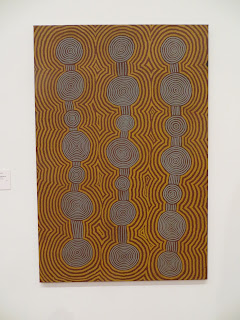 |
| Tingarri story at Kiwirrkura by Fred Ward Tjungurrayi |
Melbourne is a film-lover's delight. In addition to the Centre for the Moving Image and the
Cinémathèque (we caught up with the documentary
Weiner! there), there seems to be one Movie Festival after another. Italian Films were featured during our week, with Latin, Jewish, Arab, and French programs coming soon. We took in
La Felicita e un Sistema Complesso (The Complexity of Happiness) (recommended).
Tucked behind the
Royal Exhibition Building, built for the 1880-81 Melbourne International Exhibition.....
 |
| Exhibition Building |
....you will find the Melbourne Museum, home to the taxidermied hide of
Phar Lap, the most famous and beloved ex-thoroughbred in Australasia. We HAD to visit as he was foaled in Timaru and we had seen his various other parts; his skeleton in Te Papa Museum in Wellington and his heart in the National Museum of Australia in Canberra. (Full disclosure: actually the heart was out for maintenance so
only saw a picture of it in 2011. I also found this fascinating item from 2014 entitled
"Phar Lap: Missing pieces of horse's heart discovered in National Museum of Australia").

This raises one of the many gripes Kiwis have with their Aussie cousins; the feeling that many
New Zealand icons have been appropriated by Oz with little or no attribution. When you visit Phar Lap in Melbourne you will find little recognition of his Timaru, NZ roots.
Australia is at least as sports-mad as the USA, so much so that the State of Victoria has public holidays before the Finals of Australian Rules Football (which occurred during our visit) and the first Tuesday in November for the Melbourne Cup horse race. In the US, we don't even get Superbowl Monday off! We didn't make it to the Aussie Rules "
footy" final but we did make it to the NRL rugby league semi-final match between the Melbourne Storm and the Canberra Raiders.
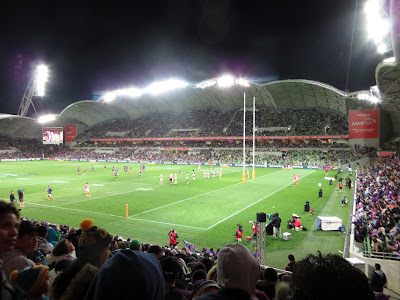 |
| The Storm down the Raiders at AAMI Park before a Finals loss to the Cronulla Sharks |
One of the joys to having a little extra time in a new place is stumbling across the unexpected. A few blocks from our hotel I wandered into the State Library of Victoria, a grand 19th century edifice with a spectacular central dome. The recesses upstairs ringing the vast reading room are filled with historical artifacts, books, and artworks. You will also find the armour worn by
bushranger Ned Kelly and his gang (which I saw also in 2011 while it was on loan to Canberra).
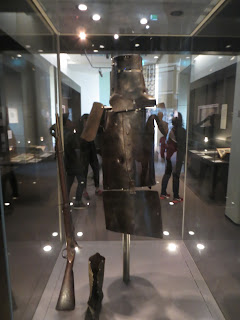 |
| The Kelly Gang armour |
There is a very efficient tram system throughout the city and it is easy to ride to the outlying neighborhoods such as the seaside suburb of St.Kilda. We mostly strolled around, taking in the view cityward from the end of the pier...

.... peeking into the Luna Amusement Park .....
.....and seeking out the Jewish Museum of Australia (unfortunately closed that day).

I haven't yet mentioned the shopping, theater, or the Melbourne Fringe Festival 2016. We caught two Fringe shows:
So to summarize Melbourne: great food, museums, movies, sports, festivals, and sights, with plenty of things left over for the next visit. It doesn't have Sydney's harborside natural beauty, but what's not to love!!
We clearly could have spent the full eight nights there but I wanted to see some of the rest of the State of Victoria, so the last three nights we spent on the road. One of the most famous scenic trips in Australia is southwest of Melbourne along the southern coast and the Great Ocean Road. It is similar to motoring along the Pacific Coast Highway on a narrow twisting route with spectacular ocean views. Like the North Coast, recent rains had caused rockslides blocking parts of the roadway. We were able to make it to the area known as the Twelve Apostles where sandstone pillars jut out of the Southern Ocean.
 |
| Matthew ? Mark? Luke? Thaddaeus?? |
It
is not clear exactly which ones qualify as Apostles, as some have
collapsed into the sea in recent years, but there are still plenty left. The geology and the waves have created other coastal formation, like bridges, arches, grottoes, blowholes, etc.
 |
| The Arch |
 |
| The Grotto |
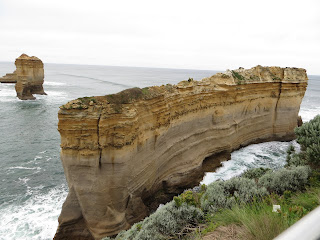 |
| The Razorback |
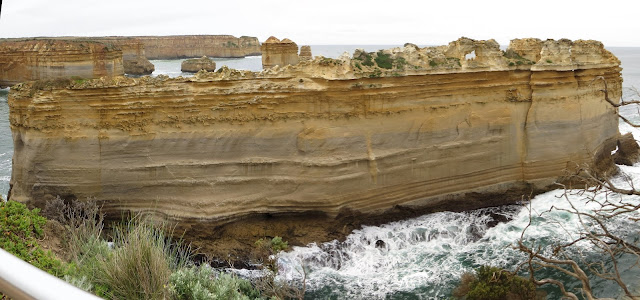 |
| And another view of the Razorback |
A bit further west, past Warrnambool, you will find Tower Hill Reserve, parkland jointly managed by the ancient Worn Gundidj aborigines and Parks Victoria. It is in a vast caldera formed by an eruption 30,000 years ago, and is a good place to find abundant indigenous flora and fauna.
 |
| Emu in carpark |
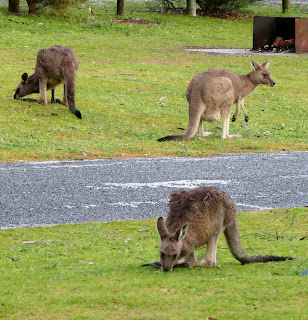 |
| A mob of kangaroos |
 |
| Koala in tree |
 |
| The Grampians as seen from the Pinnacle Lookout |
From there we headed north to the rocky sandstone crags of
Grampians National Park , AKA Gariwerd to local tribes. (Here is a tip for travelers: when you arrive in the airport in a new country or city, if you see stunning large photos of regional attractions, try to work them in your itinerary. Both the Twelve Apostles and the Grampians are proudly on view as you deplane in Melbourne.) The walk to Pinnacle Lookout was well worth it, with commanding views down on the village of Halls Gap where we stayed. At the summit a young Iranian couple rewarded us with Lindt chocolate balls and then phoned their family in the Middle East. Life in the 21st century!!
 |
| Approaching the Pinnacle Lookout |
The last stop was Ballarat, a center of the 1850's Victoria gold rush, Many 19th century buildings remain.
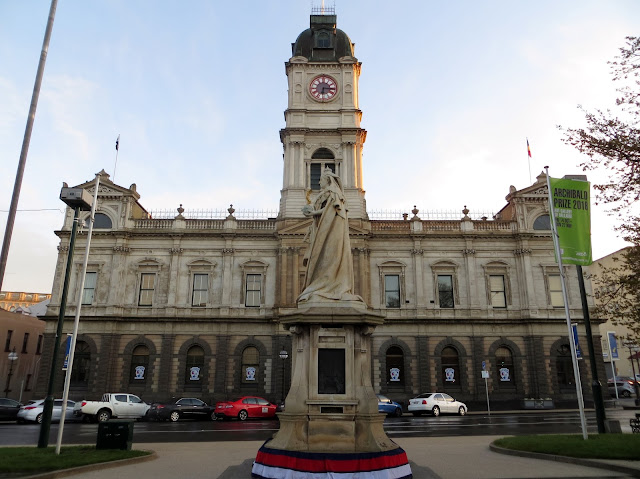 |
| Town Hall |
 |
| Her Majesty's Theatre |
 |
| Sugg lamp fronting the former National Mutual Insurance Co. Blgd. |
Ballarat is also famous for the short-lived but very influential
Eureka Rebellion. Gold miners had to pay exorbitant taxes and had no vote, so
in 1854 they revolted, burned their mining licences, and held out in the makeshift Eureka Stockade. The uprising was
brutally put down December 3, 1854, but although they lost the battle
the protesters won the war. The taxes were abolished, voting rights
secured, and the labour and democracy movements in Australia were founded. You can see the original flag of the rebellion at the Museum of Australian Democracy at Eureka
(M. A. D. E.) on the site of the stockade.
The museum also honors other democratic movements in history from around the globe. A current exhibit is about a project of
Dr.Christina Henri called "Roses From the Heart".
It is described in part:
"For the past 13 years she's been working on a memorial - a massive
work of art - to the thousands of convict women transported to
Australia.
Christina invited people from around the world to make
and contribute a servant's bonnet, symbolising the life of each of the
25,566 women who were transported from 1788 to 1853.
Christina has now received over 24,000 bonnets for what will, she hopes, become a permanent memorial in Tasmania".
 |
| Bonnets on display at the M. A. D. E. |
That's all for now. In a few weeks will would head to Auckland with our crack team of eight to compete in the 2016 National Pub Quiz. Wish us luck! Then back home in December and January.
(To be continued.....)








































